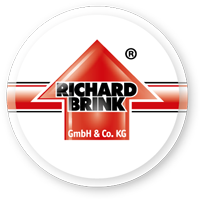Richard Brink’s fleet of machinery and range of products are constantly growing, which is why the company expanded its production site to include a new hall complex in 2013. As production has increased, so too has transport traffic on the premises. HGVs weighing tonnes regularly drive over the area. The drainage system also has to withstand these constant loads, which is why a 15m long Ferro Magna heavy-duty channel from the company’s own production hall was installed.
‘Plug-in’ system makes installation easier
Craftsmen from the company Klaus Brok Garten- und Landschaftsbau installed the channel in no time, without needing heavy machinery. The Ferro Magna can be quickly and easily laid because the plastic connection is so lightweight. The individual channels can also be quickly connected thanks to the pre-assembled ‘plug-in’ system. The plastic inserts absorb vertical loads and deflect them down into the ground. Horizontal shear forces are compensated for by crossbars within the channel, preventing the compression of the channel body. Since the plastic is enclosed in the channel body, it is protected from UV radiation. The product, which was tested by a material testing body, conforms to DIN EN 1433, which defines standards for dewatering channels for traffic surfaces. The channel also meets load classes A 15 to D 400.
Laid step by step
The drainage specialists laid the Ferro Magna, weighing 10.7kg/m with a nominal size of DN 100, in the entrances to the premises of Richard Brink GmbH & Co. KG. Even with such a low intrinsic weight, the 2mm thick stainless steel channel meets the requirements for load class D 400.
After the first working steps – excavating the earth and installing the drain pipes – were complete, the concrete for the strip foundation for the heavy-duty Ferro Magna channel could be laid and levelled.
An end piece was attached to the first channel, and the channel was connected to the installed drain pipes via the drain nozzle. The channel thereafter revealed another advantage: all of the channel segments have ‘plug-in’ connectors at either end, to which the plastic inserts of the next channel can be easily attached. The pre-assembled connector plates make threading in the ‘plug-in’ system easier and allow for the channel segments to be connected via screw connection if desired.
In the next work step, the installers lined the sides of the channels with concrete. Anchors attached through the connectors to the outside walls of the system and pressed into the concrete provide an additional connection to the foundation. The craftsmen laid additional concrete next to the channels to achieve a stable hold for the Ferro Magna and incorporate the channel into the paved surface, so that the adjacent pavement could be directly embedded into the foundation. As a result of the optimal substrate, the channels transfer the pressure of the passing vehicles directly into the ground. The sturdy design ensures reliable drainage via the heavy-duty channels with an inlet width of 150mm in the long term.
Covered with designer gratings
In a final work step, the installers covered the channels with 7 × 7mm Hydra Linearis longitudinal bar gratings. The gratings, which are completely made of stainless steel, were also used in the heavy-duty design, with a reinforced underside that absorbs high static and dynamic loads with no risk of damage. The straight lines of the gratings elegantly accentuate outdoor spaces. Their excellent product design won the international Red Dot Design Award in 2010.
Permanently stable system
Despite its light intrinsic weight, the dewatering system is impressively stable. It can withstand enormous force long-term. In addition to the standard versions, Richard Brink also delivers channels and gratings in custom dimensions, creating individually adapted drainage solutions for heavy-duty use on courtyard surfaces, entrance ramps or in garage entrances.











